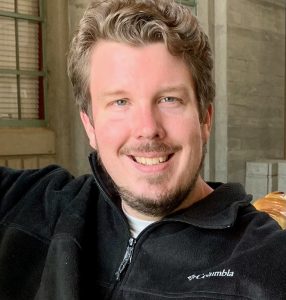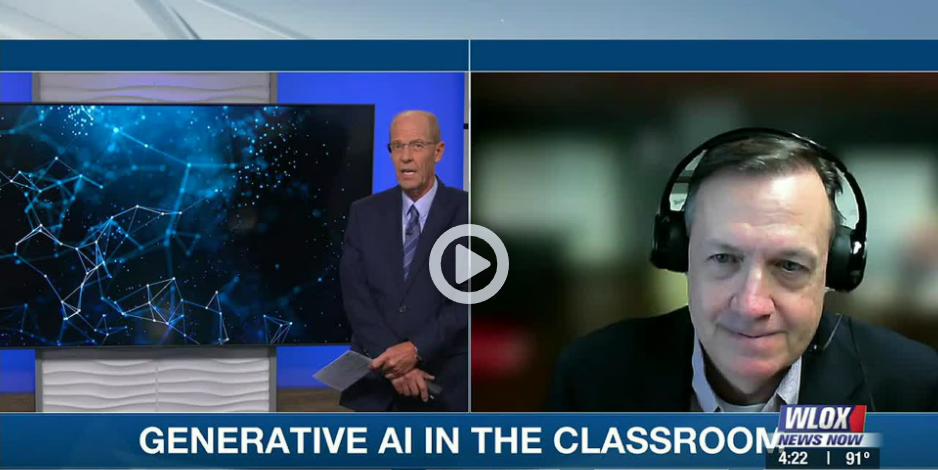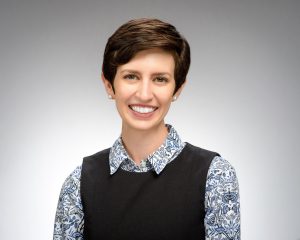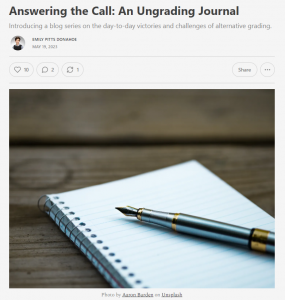Want to listen to CETL staff talk about teaching and learning topics they’re passionate about? This November, our Josh Eyler and Liz Norell were guests on four different higher education podcasts!
 Liz Norell, associate director of instructional support, appeared on the long-running Tea for Teaching podcast, hosted by John Kane and Rebecca Mushtare, in episode 313, “Supporting Neurodiverse Students and Faculty.” You may recall Liz facilitated two workshops on teaching neurodivergent students this fall at CETL, and the resources she shared from those workshops have gotten some attention. After guesting on Tea for Teaching, Liz appeared on the Student Success Podcast hosted by Al Solano in an episode titled “Supporting Neurodivergent College Students.” We’re glad to have Liz’s expertise on this topic at CETL, and we’re glad she’s sharing her expertise with the wider teaching community!
Liz Norell, associate director of instructional support, appeared on the long-running Tea for Teaching podcast, hosted by John Kane and Rebecca Mushtare, in episode 313, “Supporting Neurodiverse Students and Faculty.” You may recall Liz facilitated two workshops on teaching neurodivergent students this fall at CETL, and the resources she shared from those workshops have gotten some attention. After guesting on Tea for Teaching, Liz appeared on the Student Success Podcast hosted by Al Solano in an episode titled “Supporting Neurodivergent College Students.” We’re glad to have Liz’s expertise on this topic at CETL, and we’re glad she’s sharing her expertise with the wider teaching community!
 Meanwhile, CETL’s director Josh Eyler made the podcast rounds, too, in advance of his forthcoming book on grades and grading called Scarlet Letters. First he appeared on the Centering Centers podcast from the POD Network, our professional association, in an episode titled “Scarlet Letters & Storytelling” where he talked with host Lindsay Doukopoulos about grades, grading, and his writing process. Then he was a guest on the Dead Ideas on Teaching and Learning podcast hosted by Catherine Ross in the episode with the lively title “Ready to Find Out What Research Tells Us about Grading and Grade Inflation? Buckle Up!” Josh has a lot of very strong (and research-backed) opinions about the notion of grade inflation!
Meanwhile, CETL’s director Josh Eyler made the podcast rounds, too, in advance of his forthcoming book on grades and grading called Scarlet Letters. First he appeared on the Centering Centers podcast from the POD Network, our professional association, in an episode titled “Scarlet Letters & Storytelling” where he talked with host Lindsay Doukopoulos about grades, grading, and his writing process. Then he was a guest on the Dead Ideas on Teaching and Learning podcast hosted by Catherine Ross in the episode with the lively title “Ready to Find Out What Research Tells Us about Grading and Grade Inflation? Buckle Up!” Josh has a lot of very strong (and research-backed) opinions about the notion of grade inflation!
In the land of the written word, Liz authored a guest post for John Warner’s Inside Higher Ed blog in which she reflected about the role that writing plays in how the CETL team functions. In her post titled “Writing as a Tool for Teamwork,” she conjectures that the kind of writing our staff members do, that is, reflective writing about our work, helps to foster a kind of psychological safety among the CETL staff. In contrast to the general academic culture that leans toward critique, Liz writes that at CETL, “We take risks, we cook up unconventional ideas, and we trust one another to give honest and supportive feedback.”
 One outlet for CETL staff writing is Emily Donahoe’s Substack newsletter Unmaking the Grade. Emily is CETL’s other associate director of instructional support, and she describes her newsletter this way: “A blog and reflective journal chronicling one educator’s experiences with ungrading and other progressive teaching practices.” That description was cited by James Lang in his Chronicle of Higher Education piece titled “Adventures in Substack,” where he offers advice for academics interested in starting their own newsletters. Emily’s newsletter made quite a splash this summer when she launched it, and it continues to be an example of the reflective writing that Liz praises in her guest post.
One outlet for CETL staff writing is Emily Donahoe’s Substack newsletter Unmaking the Grade. Emily is CETL’s other associate director of instructional support, and she describes her newsletter this way: “A blog and reflective journal chronicling one educator’s experiences with ungrading and other progressive teaching practices.” That description was cited by James Lang in his Chronicle of Higher Education piece titled “Adventures in Substack,” where he offers advice for academics interested in starting their own newsletters. Emily’s newsletter made quite a splash this summer when she launched it, and it continues to be an example of the reflective writing that Liz praises in her guest post.





